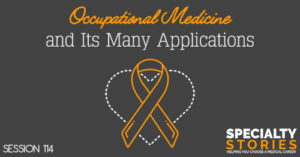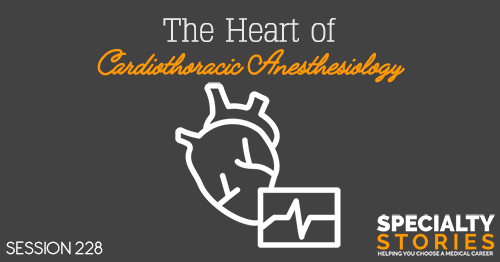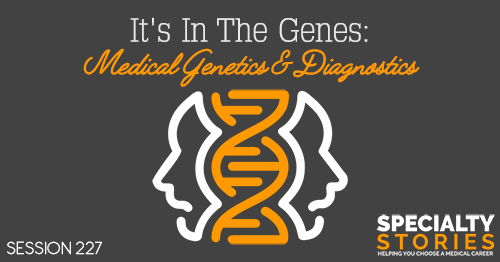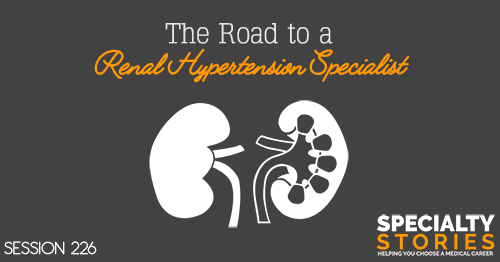Apple Podcasts | Google Podcasts

Session 114
Do you know what Occupational Medicine is? Although the specialty has been around for a long time, it’s not very well-known. If you like variety and a detective type of work in exploring what could be causing someone to be ill, Occupational Medicine is an amazing specialty you should check out.
Dr. Jacqueline Moline is an Occupational Medicine specialist in an academic setting. She’s here today to help us understand what they do, why such specialty is very important, as well as the ins and outs of the specialty.
If you’re a premed student, please do check out all of our other podcasts on the Meded Media.
Listen to this podcast episode with the player above, or keep reading for the highlights and takeaway points.
[01:50] What is Occupational Medicine?
Jacqueline didn’t know about Occupational Medicine when she was in medical school. She first got interested in the specialty during her Internal Medicine residency program. She had the opportunity to rotate through and meet with faculty. At that point, she thought it was the career choice that appealed to her.
Occupational Medicine is a discipline that deals with how the work environment can affect health. It’s a global type of specialty in the sense that you have to have an understanding of what the person does, workplace hazards, and how the body is going to be affected.
'Occupational Medicine cares about not just the 'what's' but the 'why's.'Click To TweetJacqueline explains that occupational medicine involves not only treating the “what’s” but also the why’s.” They can treat your “what” but they also need to understand “why” you have this. What can they do to identify what might be causing it?
For instance, an adult presents to you with new-onset or a sudden exacerbation of their childhood asthma. The first question they would ask is what are you exposed to know that you weren’t exposed to before? So they can treat your asthma and give you the appropriate inhalers or whatever medications needed. But they’re also concerned with identifying why you have it.
If they can identify why you have it and work in a way to avoid that exposure then you don’t have asthma anymore.
Just a little backstory here. I used to work as a flight surgeon in the Air Force and we deal with Occupational Medicine all the time. We evaluate the mechanics working on planes and the paint shops where they’re dealing with all these chemicals.
Occupational Medicine is a specialty within Preventive Medicine. If you can identify the hazard, you can prevent it.
[Related episode: What is Preventive Medicine? A Look at Academic Prev Med]
[06:35] Occupational Medicine as a Residency and Fellowship
Occupational Medicine is a residency/fellowship. It’s called a residency because technically you only need to do an internship and then join the two-year training program. Or it can be called a fellowship if you have done three years of training in Internal Medicine or Family Medicine.
She wanted to get the additional training because she wanted to learn more about the things she didn’t know about like toxicology, epidemiology, etc.
'Occupational Medicine is so vast that you can have many different roles.'Click To TweetYou could actually play several roles as an Occupational Medicine specialist. You could have a policy role or work to help foster new policies in the federal or state government. You could work for a large corporation or be in academia. You could work in a clinical practice and do clinical Occupational Medicine all the time.
Moreover, Jacqueline wanted to know how to take an occupational history and practice it because this wasn’t something they had time for in internal medicine due to time demands.
[08:05] Traits that Lead to Becoming a Good Occupational Medicine Specialist
Curiosity is important. Try to figure out what’s going on. Often, you’re like a detective. It’s going back to being really curious and just asking questions and having an open mind.
'Many times, we're making decisions right away when we see a patient. But when it comes to a patient coming to see me, I have to listen and keep probing and probing.'Click To Tweet[10:12] Types of Patients
Jacqueline works in an academic setting and has a more specialized practice. She sees patients who’ve had asbestos exposure or patients were exposed 30-60 years prior. Then they’ve developed an asbestos-related disease. Or they’ve had the exposure and they monitor their health to make sure they don’t develop diseases.
She covers a range of patients from those with asthma to manufacturing people exposed to various chemicals. She takes care of painters who might be exposed to solvents. She had also looked at folks who’ve had exposures to mold, heavy metals, or molten lead.
Based in New York City for many years, she had a uniquely New York type of exposure. They did a study on the health effects of theatrical smoke on actors on Broadway to see if that was impacting their voice. They also looked at any health effects related to the special effects used on stage.
They looked at whether wood preservatives can cause cancer. They’ve done studies on firefighters looking to see at increased rates of cancer. One of the things she has been doing for the last 18 years is monitoring the health of folks exposed after 9/11 at the World Trade Center site.
'It's this vast variety of different types of clinical scenarios that people could encounter.'Click To TweetSome people in her field see more ER-type, urgent care stuff where they may see people with slips, trips, and falls at work. Jacqueline had taken care of folks with repetitive strain injury from overuse of the computer. It could also be something they developed as court stenographers or those who had to punch tickets on the train where they had to use their hand repetitively and developed thumb problems.
What she loves about her specialty is that she never knows what kind of exposure she’s going to encounter through her patients.
[Related episode: 6 Tips For Improving Patient Communication]
[13:45] The Importance of Occupational Medicine
Jacqueline explains the difference between Internal Medicine physicians and Occupational Medicine specialists treating specific occupational-related cases.
As an Internal Medicine physician, you’re not going to be necessarily well-versed in the regulations that are going to be the underpinnings.
How often should you be monitoring someone who has been exposed to lead? Do you know when they can go back to work? What does their lead level need to be?
If they’re exposed to asbestos, do you know what you should be looking out for on a regular basis and how you should be screening?
Are there any regulatory requirements depending on their job that you have to fulfill? So they have worker’s compensation and are you treating them according to the guidelines that might be present in your state?
Do you have time to take the full history to figure out what’s going on in someone who’s presenting rather than just treating them? Jacqueline spends about 80% of her time or more, talking to the patient to figure out what’s going on with them. The exam part is usually much shorter as well as the test-ordering and results.
'Taking the history and starting with all other different exposures to get a true understanding of what they do is really critical.'Click To TweetEvery discipline has its acronyms. There have even been primary care physicians who came to her and didn’t know how to begin to do it. And she’d be happy to work in tandem with them.
Jacqueline underlines the importance of thinking in terms of what the person is doing for a living or what their hobbies are.
The exposure might be the same, and it’s just the location is different. If it’s in your home, it’s considered environmental exposure. If it’s at the workplace, it’s called occupational exposure. But it’s really a continuum which is why the specialty is usually called Occupational and Environmental Medicine.
[18:30] Having Real Human Interaction
One of the beauties of this specialty, Jacqueline expressed, is that there is so much appreciation from your patients that you’re having a conversation with them. It’s not only transactional. It’s not just clicking a bunch of boxes but actually having a conversation about your life.
People might be asked about their family history but, for instance, it’s usually whether their dad died of heart disease, diabetes, or cancer. It’s never like asking what their dad does for a living. Because if your dad was a shipyard worker then they need to know that because then they would know you’re at risk for asbestos-related diseases.
'You're getting to know somebody in such an in-depth way compared to what the realities of many other practices are in terms of time constraints.'Click To Tweet[19:34] Typical Day
Currently, Jacqueline is the department chair so she has more meeting time than the normal person, plus she’s in academic medicine. Part of her time is spent doing research projects and research protocols and working on getting the date and the results. Then she’d have to write the stuff up.
She also runs large clinical programs so she has to make sure the staff is doing the right things and make sure everything is running appropriately.
Her favorite part of the week is seeing patients. She gets to do what she had always wanted to do in medical school. She loves taking care of the patients and meeting up with them.
She also mentors both her faculty and other doctors. They’re trying to cascade where they’re trying to begin to mentor other people to have opportunities that will allow them to grow.
[21:34] Academics vs Community Setting
Jacqueline initially thought she’d be more hospital-based. She actually went to the University of Chicago, which is very academic-based, and she did her Internal Medicine residency at Yale. At the former, you’re considered a faculty member when you’re seeing patients there. While at Yale, there were both private physicians and Yale physicians, more of a mixed model.
She had always thought of staying in academic medicine. She likes the idea of doing clinical research. So she didn’t think she would necessarily want to see patients five days a week. She wants to mix it up and do some other things to feed her curiosity.
The field has allowed her to do all sorts of different things in her career from lead exposure to projects looking at bone lead turnover. She was looking at actors, firefighters, and 9/11-related stuff to working with asbestos-exposed individuals.
'There's so much opportunity in Occupational Medicine and there's also the corporate side of Occupational Medicine that some people really enjoy.'Click To TweetOn the corporate side of things, one can work as a corporate medical director or a company staff physician. Some physicians also get involved with travel medicine and government roles.
Jacqueline found academics to be the right fit because it allowed her balance between patients and research. Plus, she gets to do policy and influencing along the way.
[24:22] Taking Calls
Jacqueline doesn’t take calls and she has not really done it since her Internal Medicine days. She considers the specialty as having a nice lifestyle. It’s more of an 8-6, 9-5, or manageable shifts. It’s very much an outpatient specialty.
'It's the specialty with the lowest burnout of all the specialties.'Click To Tweet[25:22] The Training Path
Occupational Medicine is a 2-year training program. During this time, you also get a Master of Public Health or its equivalent. So you will be doing MPH work and studying with other students. You will be taking courses in the core requirements.
Then you begin to see patients as you would with an attending physician in the specialty. You have supervised patients that you see and you begin to work on various research projects.
In Jacqueline’s case, she did a variety of projects with a mentor. One of which gave her early exposure to working with pesticides. This allowed her to learn about pesticides and their health effects.
In some programs, you need to do a thesis. Other programs require a capstone project. It’s a multidisciplinary project. Not only do you need to interact with your medical team, but you also have to be well-versed in industrial hygiene. So when you get a report, you would understand it.
'You have to be well-versed in industrial hygiene – the science of measuring what kind of exposures people have.'Click To TweetFor example, you may do a worksite visit to understand how people can get exposed. You might work with a safety engineer and figure out what processes could be improved to make it a safer environment.
You will be working with occupational health nurses as well. So you need to think about it in terms of multidisciplinary and interdisciplinary.
[28:30] How to Be a Competitive Applicant for Residency
Do a primary care specialty first. This provides you with the foundation that it’s hard to gather without having those years. Ideally, this would take three years, but if you can’t, do two years to just get more experience. Then you transition over to Occupational Medicine.
Jacqueline used to be a residency director and says they’ve had some amazing trainees who came from different fields. Some came from Radiation Oncology where they didn’t feel it was the specialty they wanted so they transitioned over to Occupational Medicine.
Try to find folks around the country who would be willing to work with you and maybe you can do a project form afar while you’re a medical student. And if you just want to do an internship and go to Occupational Medicine, that works as well.
[Related episode: How to Think About Choosing a Residency & Specialty]
[30:50] What She Wished Primary Care Physicians Knew About Them
Jacqueline wished primary care physicians knew they could work together better to identify what’s going on with their patients. They should think about the external factors that might be affecting health. But they don’t have a lot of times as their days are so busy.
'There are so many demands on primary care – from electronic medical records to the numbers of patients they need to see.'Click To TweetJacqueline encourages primary care physicians to use them so they can better care for their patients. Let them at least take that long history and identify if they can find a reason why their asthma, for instance, isn’t getting better, or potentially cure it.
If someone comes with a new-onset unusual condition and they just switched jobs, send the patient to them. This way, they can do an inventory of what they might be newly exposed to in the workplace that might explain why their blood count is unusual.
'Think of Occupational Medicine as a support for you in a way that we can co-manage a patient... let them do the what's and I'll go for the why's'Click To Tweet[33:14] Doing Inventories
If a patient is a member of the union, often the union can help and assist. But by law, the workplace has to provide the information. But you can also work with your patients.
You can find what is called MSDS’s (Material Safety Data Sheets) online to get a sense of what they’re exposed to.
Sometimes, they will lean into what is actually in that particular substance as it may have proprietary secrets. You can call the company and they have to tell you as a health care provider what it is if it could be causing adverse health effects.
This can be time-consuming and this is one of the challenges they have. But that’s part of identifying the mystery of why someone might be sick. If they’re using a substance, they have to have it available to all their employees and that’s the law.
'You as a clinician can often be an impetus for making sure that there is transparency.'Click To Tweet[34:50] Working with Other Specialists
Jacqueline deals with pulmonologists a lot as well as ENT and GI. They also deal with mental health as some exposures have led to mental health issues such as PTSD, anxiety, stress, or burnout.
Other specialties they work with include thoracic surgeons, dermatologists for rashes in the workplace, and orthopedics and physiatrists for ergonomic issues.
[36:10] Fun Opportunities Outside of a Clinical Workplace
There are government roles you can do whether on a state, federal, or local level. There are corporations looking to hire doctors. There are always tons of job opportunities available in Occupational Medicine.
There are also corporate medical director positions available. There’s also the academic setting.
[37:10] What She Wished She Knew About Occupational Medicine
No one knows what Occupational Medicine was and she wished she knew about it going into medicine. When she went to Yale and there was Occupational Medicine, she felt it was the natural fit for her.
Over the years, she has found it to be a challenge that she would always have to describe what she does. Part of the reason is that they’re not a specialty that’s direct from medical school. It means that people choose something else first before they go into Occupational Medicine.
'Realize that while the specialty has been around for a very long time, it's not very well-known.'Click To TweetJacqueline encourages people to contemplate on the curiosity and thinking outside of the box. Think about what might be causing things and not just taking it at face value and treating what’s causing things.
[38:10] The Most and Least Liked Things
What Jacqueline likes the most about Occupational Medicine is its variety. She never gets bored. Things are always different even if she’s reviewing the same type of case, she can always learn something new everyday.
'It gives me an opportunity for a window into so many people's different lives and what they do.'Click To TweetOn the other hand, what she likes the least is paperwork and dealing with archaic systems including worker’s comp or delays of trying to get patient care.
[40:00] Major Changes in the Field and
One thing that would stay the same for Occupational Medicine is figuring out what someone does and this is a constant. That said, there will be changes in technology and new types of jobs that people have. We have to morph and adapt to whatever those jobs would be to understand the risks associated with them.
[40:48] Final Words of Wisdom
If she had to do this all over again, she would still have chosen the same field. It affords her a great lifestyle as well as an opportunity to have curiosity and learn something new everyday.
If this specialty is something you’re interested in, reach out to someone in your region. There are education and research centers located across the country.
Reach out to the medical directors of a residency program and see if there’s someone interested in having a medical student work with them. Learn more about the field as it has so many opportunities.
Links:
SEARCH SITE
LISTEN FOR FREE











